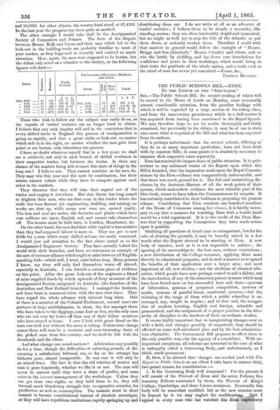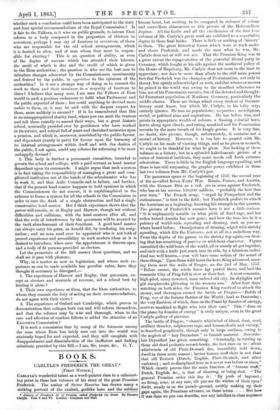THE PUBLIC SCHOOLS BILL.—ETON. To THE EDITOR OF THE "SPECTATOR."
Sin,—The Public Schools Bill, the second reading of which will be moved in the House of Lords on Monday, must necessarily attract considerable attention, from the peculiar feelings with which it will be regarded by a large section of the ruling class, and from the unnecessary prominence which in a dull session it has acquired from having been mentioned in the Royal Speech. We may therefore hope to see its merits thoroughly and fairly examined, but previously to the debate, it may be of use to state once more what is required of the Bill and what has been expected from its authors.
It is perhaps unfortunate that the several schools, differing as they do in so many important particulars, have not been dealt with by separate Bills ; in some points it is absolutely necessary to examine their respective cases separately.
Eton has received the largest share of public attention. It is quite evident to any unbiassed reader of the Report upon which this Bill is founded, that the impression made upon the Royal Commis- sioners by the Eton evidence was comparatively unfavourable, and that there was much ground for it. The full and unshrinking dis- closure by the Assistant-Masters of all the weak points Of their, system, which makes their evidence the most valuable part of the blue-book, seems to have taken the Commissioners by surprise. It has certainly contributed to their boldness in proposing the present scheme. Considering that Eton numbers one hundred members of the House of Commons among her alumni, it is hardly neces- sary to say that a measure for touching Eton with a hostile hand would be a bold experiment. It is to the credit of the Eton Mas- ters that by supporting the Cormnission they have made action upon it possible.
Omitting all questions of detail (not as unimportant, but for the
sake of clearing the ground), it may be broadly stated in a few words what the Report showed to be wanting at Eton. A new body of statutes, such as it is not impossible to enforce ; the opening of the mastership§ to the best men, without restrictions ; a new distribution of the College revenues, applying them more directly to educational purposes, and in such a manner as to spread the benefits of their application over a larger area ; and most important of all, new studies,—not the abolition of classical edu- cation, which people have now perhaps ceased to call a faibire, not the introduction of any of the numerous patent systems whieh may have been found more or less successful here and there—systems of bifurcation, systems of perpetual competition, systems of marks, systems of parallel forms, monitorial systems,—but the widening of the range of ideas which a public schoolboy is en- couraged, nay, taught to acquire ; and to that end, the recogni- tion of modern learning, English and foreign, scientific and grammatical, and the assignment of a proper position in the hier- archy of discipline to the teachers of these co-ordinate studies.
It seems highly important that in inaugurating changes over BO
wide a field, and changes possibly of magnitude, they should be effected on some well-calculated plan and by the best administra- tors obtainable. The Government Bill proposes to effect them in the only possible way—by the agency of a committee. With un- important exceptions, all reforms are intrusted to the care of what is unhappily called a Governing Body, and unfortunately, as I think, made permanent.
If, then, it be allowed that changes are needed (and with The Report on Public Schools at my elbow I take leave to assume this), two points remain for consideration :-
1. Is the Governing Body well composed ? For the present it will consist of the Provost of Eton and the seven Fellows, five honorary Fellows nominated by them, the Provost of King's College, Cambridge, and three Crown nominees. Eventually this body will be somewhat modified, but as the new statutes must
be framed by it we may neglect the modifies I W appeal to every man who has watched this E whether such a conclusion could have been anticipated to the sixty and four special recommendations of the Royal Commission? Is it fair to the Fellows, is it wise on public grounds, to intrust Eton reform to a body composed in the proportion of thirteen to seventeen, perhaps I may say of fourteen to seventeen, of those Who are responsible for the old school arrangements, which it is desired to alter, and of men whom they must be respon- sible for electing? This is no question of ability, or even of the degree of success which has attended their labours, the merit of which is due and the credit of which is given to the Eton authorities ; the question is, who are the best men to introduce changes advocated by the Commissioners unanimously and desired by the public, in opposition to the opinions of the authorities? Is it not a strange way of doing so to commit the work to them and their nominees in a majority of fourteen to three? I believe that many men, I am sure the Fellows of Eton would in such a position endeavour to fulfil what Parliament and the public expected of them ; but could anything be devised more unfair to them, or, it may be said with the deepest respect for them, more unlikely to succeed? If it be remembered that this is no misappropriated charity fund, where you can snub the trustees and tell them roundly to amend their ways, but a great historic school, nominally presided over by gentlemen who have worked in its service, and retired full of years and cherished memories upon a pension, and which is, moreover, nourished by the public fayour, and dependent (surely in part) for favour upon the harmony of its internal arrangements within itself and with the desires of the public, I ask again, could any scheme for reforming it be more unhappily devised ? 2. This body is further a permanent committee, intended to govern the school and college, with a paid servant as head master dependent upon its commands. I might argue that such a system is in fact taking the responsibility of managing a great and com- plicated institution out of the hand's of the schoolnisster who has to work it; and that 'Aline Councils end in failure, and further, that if the present head master happens to hold opinions in which the Commissioners do not concur, it is unphilosophical in the extreme to frame a system for all the schools in the Commission in order to turn the hank of a single obstruction and foil a Sinile conservative head master. But I think experience shows that the power will remain, as at Rugby and Harrow, though not without difficulties and collisions, with the head masters after all, and that the evils of interference by the governors will be averted by the tacit abandonment of their functions. A good head master can always carry his point, as Arnold did, by tendering his resig- nation; and no man need ever be appointed who is not both of proved experience and accessibility to such modern ideas as it is desired to introduce, when once the appointment is thrown open, and a body of fit persons provided as electors.
Let the promoters of the Bill answer these questions, and we 'Shall see it pass with pleasure. Why, in a matter so new to legislation, and where such ex- perience as can be made available has peculiar value, have they thought it neeessRry to disregard,- 1. The experience of Harrow and Rugby, that governors, ex- cept as electors and stewards of revenue, aid a school bast by leaving it alone? 2. Their own experience at Eton, that the Eton authorities, to ivhom they commit the duty of acting on their recommendations, do not agree with their views?
3. The experience of Oxford and Cambridge, which proves to demonstration that colleges both can and will reform themselves, and that the reforms may be wise and thorough, when to the Care and affection of resident fellows is added the stimulus of an Executive Commission?
It is such a commission that by many of the foremost among the sons whom Eton has lately sent out into the world was anxiously hoped for and expected, and they will complain with disappointment and dissatisfaction of the inefficient and halting substitute provided by this Bill.—I am, Sir, yours, &c., G. Y.































 Previous page
Previous page